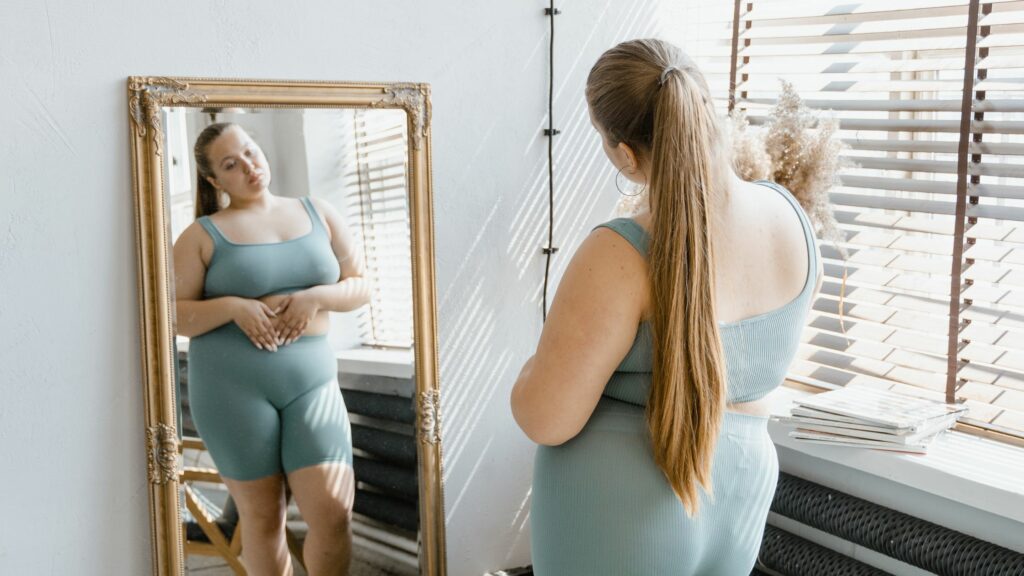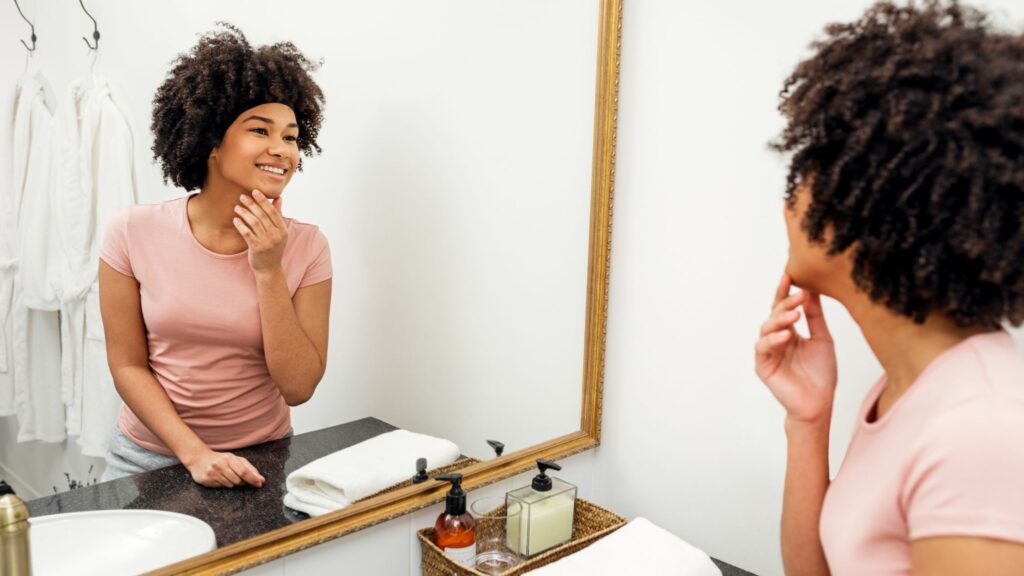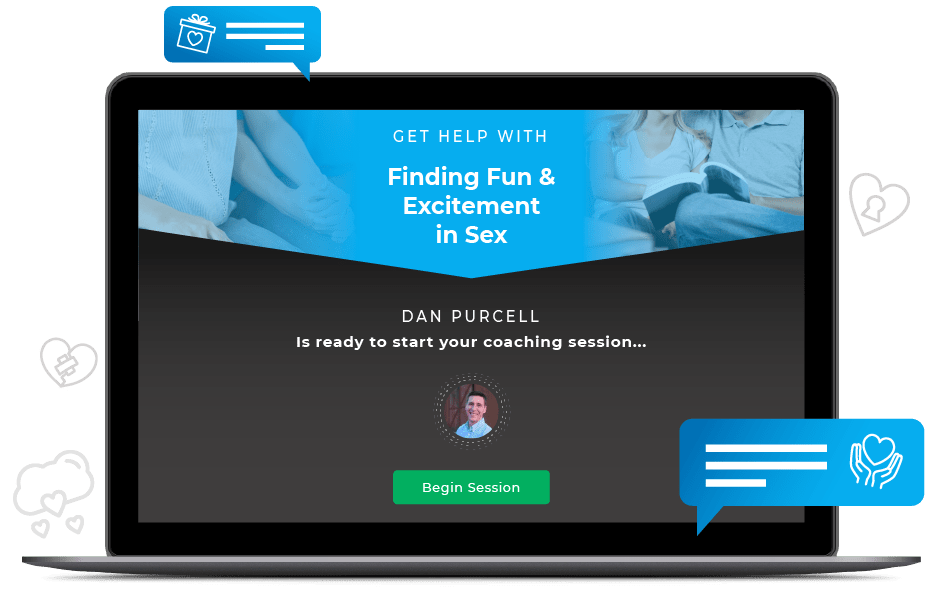Unfortunately, body dissatisfaction is under-researched but all too prevalent in today’s society. Research is all over the place, with a range of prevalence rates from 11%-72% for women, and 8%-61% for men. This discrepancy is largely due to different definitions of body dissatisfaction. However, my own experience has been that most women in my life struggle with their body. That was also the experience of Vanessa Oly, a hormones and fertility nutritionist. We talked with Vanessa about body image issues on this week’s podcast! Here, we talk about a few ways people experience body dissatisfaction, how that can affect our relationships and sex life, and some advice on how to change your mind set!

Body Image
Body image is what you think and how you feel about your body. It is not always related to your weight or size. Most people experience body dissatisfaction at some point in their life, which means that for some reason they aren’t happy with the way their body appears. Some people are unable to see their body in a realistic way, which is what psychologists call “body dysmorphia”. Others are so affected that they will restrict their eating or eat ONLY foods they deem “clean” or healthy in an obsessive way. Although this will not apply to everyone with body image issues, it might be beneficial to define these eating disorders. If you recognize yourself in these definitions, know you are not alone! There is hope for you and many people who would love to help.
Eating Disorders
- Anorexia Nervosa: This disorder entails the restriction of energy intake (i.e. limiting your calories) which leads to significantly low body weight. This restriction is due to an intense fear of gaining weight or becoming fat, as well as a disturbance in the way one’s body weight or shape is experienced and undue influence of body weight and shape on self-evaluation. In other words, a person can’t tell what a healthy body should look like and makes how they think they look a big part of their self worth.
- Bulimia Nervosa: This disorder is characterized by the same “body dysmorphia” as Anorexia. However, Bulimia usually includes a binge-purge cycle, where a person will feel out of control and eat way more than is good for them, and then feel guilty and compensate by making themselves throw up or do something else to maintain relatively normal body shape and weight. This pattern is really hard on the body physically as well as mentally.
- Binge Eating: This disorder is episodes of out of control eating, without the purging or compensating actions.
- Orthorexia: This unofficial but highly recognized diagnosis is an unhealthy obsession with eating foods in a healthy way. Eating nutritious foods is important and good for our bodies but when you suffer from orthorexia you obsess about it. Some symptoms of orthorexia include high levels of concern about the quality of your food which could lead to anxiety. You may avoid social events, eating out, or eating food others have prepared because it doesn’t meet your standards. Orthorexic people also are fearful of losing control. If they don’t prepare the food, count the macros, weigh the food, or research the ingredients they believe it could be disastrous to their health or health related goals.
If you think you might be struggling with one of these disorders, know that help is available! You may want to consider contacting a therapist, or finding a source of good information. Vanessa Oly said she started her journey by listening to the Brain over Binge podcast. Her website and Instagram also have helpful information. Another good resource is the Center for Change website. They offer a lot of good resources and have a treatment facility in Utah.
These disorders are more common than some might think, and often go undiagnosed. However, these are not the only ways people experience body dissatisfaction.
Body Dissatisfaction

Most people who experience body image issues feel uncomfortable in their body. They may get anxious that people will judge them for their perceived imperfections. Body image issues will lead someone to cover up, excessively exercise, not eat, or simply feel bad about themselves. These issues can come from a number of sources, including…
- Messages we’ve heard: From the moment we are born, people comment on how we look. Sometimes these comments are positive, and sometimes they are negative. These negative comments tend to stick with us if we let them and will add to the narrative we tell ourselves about our appearance.
- Social Media and Societal Expectations: Along with messages about our actual body, we get bombarded with messages every day about what the ideal body should look like. Society says women should have big butts but small waists, have perfectly tanned skin with no imperfections, and be slim but strong. Men are supposed to be tall and muscled and traditionally “masculine”. Social Media is the biggest peddler of these impossible expectations. Filters, photoshop, and edited photos are commonplace these days. Compared to this “ideal”, many people feel like they can’t ever measure up.
- Examples: We are taught how to develop our relationship with our bodies from role models in our lives. This could be our parents, friends, or even the characters we see on TV. If these role models are seen criticizing their bodies, then that is what we think we are supposed to do too.
These issues lead to an unhealthy mindset concerning our bodies, which in turn can lead to unhealthy behaviors. Vanessa shared that she used to be mean to her body, constantly working out and limiting her calories because she didn’t like the way she looked. She explained that once she started to work on her mind set, she was able to take care of and love her body. She experienced more happiness and health than she had ever imagined! So if you have a negative relationship with your body, don’t use this as another thing to beat yourself up about. Let’s learn together how to love our bodies.
How Does This Affect Sex?

Body image issues affect our wellbeing in a number of ways. One aspect I wanted to highlight before we move on is the effect negative body image can have on our sex lives. When our mind and bodies aren’t healthy, our sex drives suffer.
- A body that isn’t getting the nutrients and rest it needs will stop sending resources to the reproductive system. Restricting food intake can disrupt our natural hormonal cycles. This will lower our desire to have sex, and make performance harder! Men will have trouble “getting it up” and women won’t be able to get as “wet” when their body isn’t being treated well.
- Mentally, allowing negative thoughts about our body to take root will lessen our desire to be intimate. We will want to avoid being confronted by our naked body. We will worry our spouse will see our flaws or be disappointed by our bodies. These worries are detrimental to desire!
The hallmark of a healthy body is a healthy sex drive. If your sex drive has tanked recently, you may want to consider your relationship with your body and how you’ve been treating it.
How Do We Change Our Body Image?
So how do we get a better relationship with our bodies? The “cure” will not come all at once, but small, consistent efforts will help us love and take care of our bodies!

Healthier Mindset
The change often starts in our brains. As Vanessa shared in her story, it can be really hard to admit to yourself you have a problem. Once you admit that your habits aren’t healthy, all of the sudden there is a huge pressure to “fix it”. Know that this process may take some time, and that is okay. Start by retraining your brain. Set rules for yourself like, “when I catch myself thinking something negative about my body, I’m going to instead thank my body for something it does for me”. Another practice is to regularly tell yourself you are beautiful, you are enough, or your body is wonderful until you start to believe it.
Examine your self image. Why do you feel the way you do? Act like a gardener, sorting through his plants to find the weeds. Consciously choose to pull out toxic ideals, unkind words, and bad examples when you find them. Remember that growth is not linear! You will have good days and bad days on your journey. Make sure to celebrate the little victories.
Healthier Body
Learn what it actually means to take care of your body. Many people with body image issues are surprised to find out that restricting your eating during the day is what causes night binging in a lot of cases. Try to eat every 3-5 hours, and remember to get a variety of nutrients; this means food from all the food groups! Yes, that includes carbohydrates. “Carbs” are not inherently bad, your body and your brain need carbohydrates to function. Meat and proteins are also necessary, so be sure to mix them in with your diet.

Getting at least 8 hours of sleep is also crucial to physical health. Your body needs time to reset. Vanessa encourages her followers on Instagram to go for a walk in the sunlight when they wake up, and then eat breakfast before they drink their coffee. Make time during the day to take care of yourself.
Healthier Relationships
Our relationships can be a big help in learning to love our bodies. For example, ask your spouse to sit down with you and tell you what they love about your body. And then you tell them what you love about their body! It may surprise you what your spouse finds attractive. Tell your spouse and the people close to you about your issues, and ask them to help you when you stumble.
Once you start working on it, you will be amazed at the relationship you can have with your body. When you treat yourself like someone who is worthy of love, who is attractive, you will start to feel the truth behind it. Want to read more? Read What a Boudoir Photographer Taught Me About My Body!

If you don’t like your body, you are not alone in your struggle. Although it may seem impossible, start today with making just a little change to treat your body better. If you need help or support, reach out for coaching, talk to a friend, try talking with Vanessa Oly or another coach like her, or contact a therapist. Please don’t ever feel like you are not worth loving, because I know that’s not true. You can learn to love your body!
Written by Amanda Severson with Get Your Marriage On!
Works Cited
American Psychiatric Association. (2013). Diagnostic and statistical manual of mental disorders (5th ed.). https://doi-org.ezproxy.frederick.edu/10.1176/appi.books.9780890425596
Lauren Fiske, Elizabeth A. Fallon, Bryan Blissmer, Colleen A. Redding, Prevalence of body dissatisfaction among United States adults: Review and recommendations for future research, Eating Behaviors, Volume 15, Issue 3, 2014, Pages 357-365, ISSN 1471-0153, https://doi.org/10.1016/j.eatbeh.2014.04.010.
M. Bucchianeri, M. and Neumark-Sztainer, D. (2014), “Body dissatisfaction: an overlooked public health concern”, Journal of Public Mental Health, Vol. 13 No. 2, pp. 64-69. https://doi.org/10.1108/JPMH-11-2013-0071






